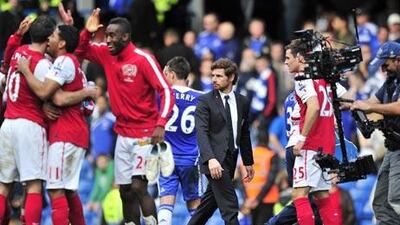With a few minutes remaining, a message flashed up on the electronic advertising hoardings bordering the Stamford Bridge pitch on Saturday. "This is Chelsea," it read.
For once, the reminder was required. Conceding five goals at home for the first time since 1989, with a defence that has been breached as often in 10 league games under Andre Villas-Boas as it was in the whole of Jose Mourinho's first season in charge, this seemed anything but Chelsea.
In part, Villas-Boas was appointed to alter the club's identity, to lend more excitement and enchant more neutrals. Losing 5-3 to Arsenal, however, was not quite what the club had in mind.
After a defeat that left Chelsea looking less like title contenders than one of four candidates to claim the division's bronze medal, an unrepentant Villas-Boas vowed to carry on attacking.
But, as Arsenal illustrated, it is a risky policy. Chelsea's precocious manager bristled at suggestions of naivety after the 3-1 defeat by Manchester United, but a second meeting with their peers reinforced such theories. The problem is that the manager lacks the personnel to implement his preferred style of defence.
Unlike his cautious, charismatic compatriot, Villas-Boas favours a high defensive line to enable his side to press opponents high up the pitch. The nearer the halfway line the back four are stationed, the greater the significance of pace.
It is a quality Chelsea's central defenders with the notable exception of David Luiz, who appears too erratic to earn his manager's trust, do not possess.
On and off the field, Villas-Boas has allied himself with John Terry. The captain was never electric, but he is slowing now.
That is coupled with the departure of his most dependable partner: Ricardo Carvalho's 2010 exit robbed Chelsea of their quickest and classiest centre-back.
If Luiz was intended to be the like-for-like replacement who could dovetail with Terry, the Brazilian's unpredictability has put the plan on hold. But Branislav Ivanovic and Alex, the alternatives, lack his athleticism. It amounts to an invitation to speedy strikers.
The mobility of the central defenders is of greater significance when the full-backs are ordered to attack.
Ashley Cole and Jose Bosingwa rarely need a second invitation, but the consequence is that each leaves space behind him. It was something Arsenal exploited expertly, especially when Andre Santos made it 2-2.
Chelsea's difficulties in their demolition derby were partly structural and partly individual. The left half of the back four, consisting of Cole and Terry, is historically the stronger unit.
Yet the left-back was troubled by Theo Walcott as he had been by Nani at Old Trafford; approaching 31, it may be too soon to say he is in decline, but his form has suffered, especially against elite opponents.
Excellence might not have been expected of the right half of the defence, but it has not been delivered.
Bosingwa's forte was always the progressive part of his game while Ivanovic has struggled to cover for his marauding colleague.
Chelsea's troubles were compounded by the ineffectiveness of the supposed shield to the malfunctioning defence, John Obi Mikel, who was outwitted by Arsenal's slick passing.
Villas-Boas has yet to settle on an automatic choice as the defensive midfielder and, if Oriol Romeu is the long-term option, the future may have to begin immediately.
That, indeed, was Chelsea's conclusion when they parachuted Villas-Boas into the manager's seat at the age of 33. The first three months of his debut campaign at Stamford Bridge suggests his is a side of two halves; the five players stationed furthest up the field are gelling promisingly, but the quintet nearer Petr Cech's goal pose questions about selection and direction.
It is amounts to an examination of Villas-Boas's mettle.
One defeat actually produced the greatest illustration of his ability, with the expert reorganisation of his eight remaining outfield players at Queens park Rangers a tactical masterclass in resourcefulness.
Now another setback calls for a rethink. The manager's immediate response on Saturday was a defiant avowal of his beliefs.
In the cold light of day, as Sir Alex Ferguson recognised after Manchester United shipped six goals the previous week, it makes more sense to prioritise clean sheets.
It would send out a distinctly familiar message: this is Chelsea.
Goals are not free at Liberty Stadium
While Chelsea and Tottenham Hotspur have let in five goals in one home league game and Manchester United six, their polar opposites are to be found in West Wales.
Five games into their Premier League lives, Swansea City have sieved a solitary goal at the Liberty Stadium. And even that, finished with unwanted aplomb, came from their own striker Danny Graham in Saturday's 3-1 win over Bolton Wanderers, his attempts to help his defence rather backfiring.
With Manchester United the next visitors, it is a record that will be tested but Swansea's return on their own turf - 11 points already - is giving them genuine hope of survival.
Norwich's desire last until the very end
Fortunate as the injury-time penalty that earnt them a point against Blackburn Rovers was, Norwich City's comeback from 3-1 down to draw 3-3 was another example of the spirit that propelled them into the Premier League.
Last season, they scored 17 goals after the 85th minute. At a higher level, it is a habit that has not deserted them.


